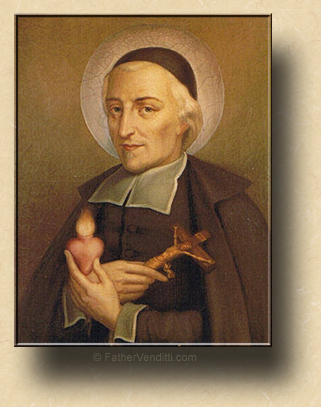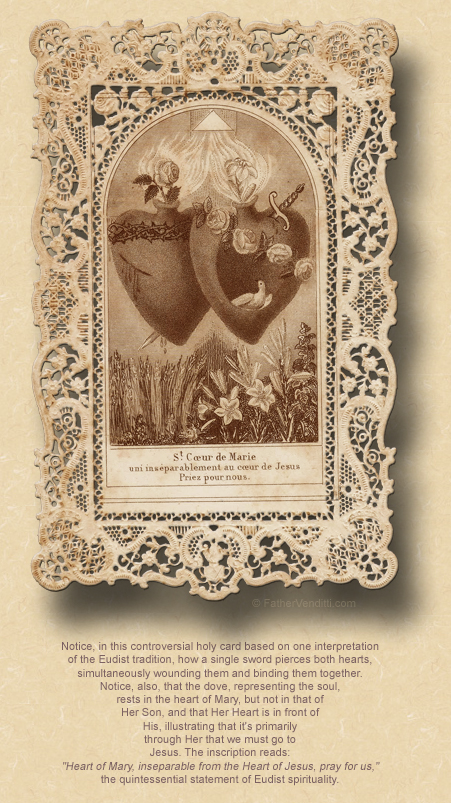When Desire and Will Don't Match.
The Twentieth Monday of Ordinary Time; or, the Memorial of Saint John Eudes, Priest.
Lessons from the primary feria, according to the ordinary form of the Roman Rite:
• Judges 2: 11-19.
• Psalm 106: 34-37, 39-40, 43-44.
• Matthew 19: 16-22.
|
When a Mass for the memorial is taken, lessons from the feria as above, or from the proper:
• Ephesians 3: 14-19.
• Psalm 131: 1-3.
• Matthew 11: 25-30.
…or, any lessons from the common of Pastors for One Pastor, or the common of Holy Men & Women for Religious.
|
The Third Class Feast of Saint John Eudes, Confessor.
Lessons from the common "Os justi…" of a Confessor not a Bishop, according to the extraordinary form of the Roman Rite:
• Ecclesiasticus 31: 8-11.
• Psalm 91: 13-14, 3.
• Luke 12: 35-40.
FatherVenditti.com
|
 1:37 PM 8/19/2019 — Before we reflect together on today’s Gospel lesson, a few words should be said about today’s saint, John Eudes. He was born in 1601 of good, devout parents at the village of Ri in the diocese of Seez, France. He was always very devout and made a vow of perpetual virginity at the time he took his first Holy Communion. He joined Cardinal Berul’s Oratory in Paris where he was ordained a priest, and served as rector of the house of the Oratory at Caen for a while. Eventually he left the Oratory to devote himself to the training and education of priests, and to this end, with five companions, he founded the congregation of priests to which he gave the most holy Names of Jesus and Mary, and opened the first seminary at Caen, which was followed later by many others. He also is credited with establishing a number of religious congregations for women. He died on this day in 1680, was beatified by Pope Saint Pius X, and canonized by Pope Pius XI. 1:37 PM 8/19/2019 — Before we reflect together on today’s Gospel lesson, a few words should be said about today’s saint, John Eudes. He was born in 1601 of good, devout parents at the village of Ri in the diocese of Seez, France. He was always very devout and made a vow of perpetual virginity at the time he took his first Holy Communion. He joined Cardinal Berul’s Oratory in Paris where he was ordained a priest, and served as rector of the house of the Oratory at Caen for a while. Eventually he left the Oratory to devote himself to the training and education of priests, and to this end, with five companions, he founded the congregation of priests to which he gave the most holy Names of Jesus and Mary, and opened the first seminary at Caen, which was followed later by many others. He also is credited with establishing a number of religious congregations for women. He died on this day in 1680, was beatified by Pope Saint Pius X, and canonized by Pope Pius XI.
His Congregation of the Hearts of Jesus and Mary is present here in this country, but not as extensively as in his native France, where they are known simply as the Eudist Fathers. When I was two years ordained, I made pilgrimage with four other priests to a variety of Holy places in France, and we had the privilege of staying in the Eudist Fathers' house of studies in Paris, which is where I became acquainted with this saint. And, I would also like to suggest that his life, in which he moved from place to place, first in this group and then in that, is a testimony to the need of letting the Lord lead us where he wants us to go, even though it turns out not to be what we had in mind for ourselves.
The young man in today's Gospel lesson is an interesting case because he’s so completely human; we can see ourselves in him on so many levels. Put yourself for a moment in his shoes. What would each of us ask our Lord if we should chance to meet Him face to face? I should like to think we would ask the same question he does, as it's the most quintessential question a man can ask: “What must I do to be saved.” Our Lord’s answer is as simple and as complete as the question, and it doesn’t surprise us because we’ve seen Him give this answer many times: “Keep the Commandments.” But he wants more than that. He wants to join our Lord and become a disciple. Our Lord gives him that chance, but first explains to him what he must give up to make that happen, as He would be obligated to do.
Compare this young man with the rabbi at the beginning of the parable of the Good Samaritan: they both ask our Lord the same question, they both get from our Lord the same simple answer, but each of them reacts to our Lord’s answer differently because each one has a different motive in asking the question.  The rabbi, we are told, wants to justify himself; the rich young man sincerely wants to do more out of the generosity of his heart. And what our Lord asks of the young man—to sell all his possessions and give the money to the poor—was what He asked of the original Twelve Apostles. The young man goes away sad because he’s not willing to do those things, and it's not hard to understand what’s happened to him here. The rabbi, we are told, wants to justify himself; the rich young man sincerely wants to do more out of the generosity of his heart. And what our Lord asks of the young man—to sell all his possessions and give the money to the poor—was what He asked of the original Twelve Apostles. The young man goes away sad because he’s not willing to do those things, and it's not hard to understand what’s happened to him here.
He’s obviously been following our Lord around for some time, and has been very much impressed. He’s got money, which means he’s probably lived a very sheltered life, and never been exposed to any kind of cause to which he might want to dedicate himself. Jesus comes along and ignites in him a youthful vigor for something to give his life meaning, and he allows himself to be caught up emotionally. He sees the camaraderie between Jesus and His disciples, and he wants to be a part of it, but his emotional needs are not matched by the will to actually do what is required to fulfill them. His emotional attraction to the whole “Jesus thing” has blinded him to the fact that, in reality, he’s not ready for the kind of commitment that is needed for him to actually join Jesus and become one of His disciples.
When our Lord asked the rich young man to sell everything he had and follow Him, he knew the young man wasn’t ready. He asked him anyway because he knew that it was the only way to force the young man to come face to face with the reality of his life. Unfortunately, the Gospel passage ends with the young man walking away sad, but that doesn’t mean that he walked away for good. For all we know, he grew up to develop a whole new set of priorities, and, after our Lord’s resurrection, may have become a passionate member of the early Church.
The lesson for us here is that the sadness he felt as he walked away was not necessarily a bad thing. Pain makes us think. And when we encounter pain in our lives because we feel we’ve been denied something we want very badly, maybe it’s time to sit down and consider what it is that our Lord is asking us to think about.

|

